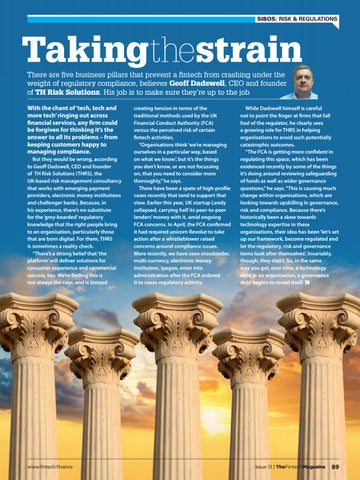SIBOS: RISK & REGULATIONS
Takingthestrain There are five business pillars that prevent a fintech from crashing under the weight of regulatory compliance, believes Geoff Dadswell, CEO and founder of TH Risk Solutions. His job is to make sure they’re up to the job With the chant of ‘tech, tech and more tech’ ringing out across financial services, any firm could be forgiven for thinking it’s the answer to all its problems – from keeping customers happy to managing compliance. But they would be wrong, according to Geoff Dadswell, CEO and founder of TH Risk Solutions (THRS), the UK-based risk management consultancy that works with emerging payment providers, electronic money institutions and challenger banks. Because, in his experience, there’s no substitute for the ‘grey-bearded’ regulatory knowledge that the right people bring to an organisation, particularly those that are born digital. For them, THRS is sometimes a reality check. “There’s a strong belief that ‘the platform’ will deliver solutions for consumer experience and commercial success, too. We’re finding this is not always the case, and is instead
www.fintech.finance
creating tension in terms of the traditional methods used by the UK Financial Conduct Authority (FCA) versus the perceived risk of certain fintech activities. “Organisations think ‘we’re managing ourselves in a particular way, based on what we know’, but it’s the things you don’t know, or are not focussing on, that you need to consider more thoroughly,” he says. There have been a spate of high-profile cases recently that tend to support that view. Earlier this year, UK startup Lendy collapsed, carrying half its peer-to-peer lenders’ money with it, amid ongoing FCA concerns. In April, the FCA confirmed it had required unicorn Revolut to take action after a whistleblower raised concerns around compliance issues. More recently, we have seen crossborder, multi-currency, electronic money institution, Ipagoo, enter into administration after the FCA ordered it to cease regulatory activity.
While Dadswell himself is careful not to point the finger at firms that fall foul of the regulator, he clearly sees a growing role for THRS in helping organisations to avoid such potentially catastrophic outcomes. “The FCA is getting more confident in regulating this space, which has been evidenced recently by some of the things it’s doing around reviewing safeguarding of funds as well as wider governance questions,” he says. “This is causing much change within organisations, which are looking towards upskilling in governance, risk and compliance. Because there’s historically been a skew towards technology expertise in these organisations, their idea has been ‘let’s set up our framework, become regulated and let the regulatory, risk and governance items look after themselves’. Invariably, though, they don’t. So, in the same way you get, over time, a technology debt in an organisation, a governance debt begins to reveal itself.
Issue 13 | TheFintechMagazine
89
